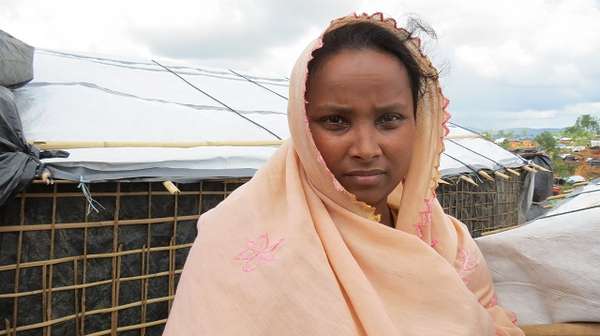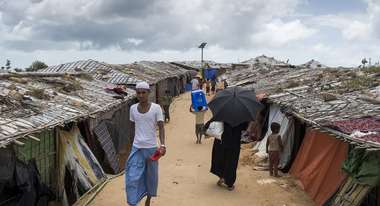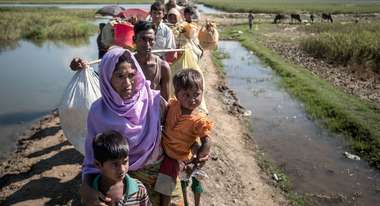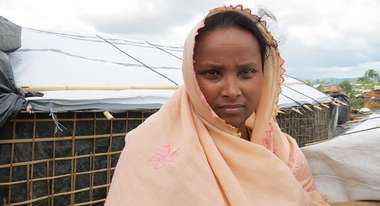"They came and shot at us."
A Humanitarian Disaster with Little Hope
More than 600,000 Rohingya have fled from Myanmar to Bangladesh. Welthungerhilfe staff member Jessica Kühnle visited different refugee camps in Cox’s Bazar, amongst them "mega camp" Bhalu Khali.
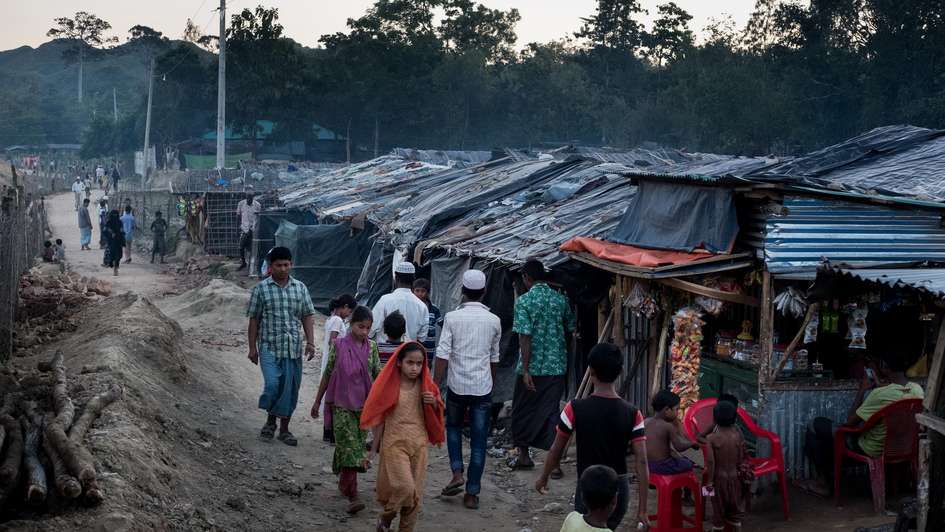
Even at the domestic airport in Dhaka I have the feeling that I am about to experience something enormous - something beyond my imagination. At the gate to Cox's Bazar, I see many employees from international aid organisations. An enormous UN plane is parked on the tarmac. The aeroplane, however, is largely filled with members of Bangladesh's upper classes.
With its 120-kilometre-long coastline, Cox's Bazar is the largest bathing resort in Bangladesh and a popular location for domestic tourism. The whole scenario appears surreal to me - on the one side, families flying to Cox's Bazar to spend a weekend on the beach, on the other side, us, the employees of international aid organisations, trying to prevent the current humanitarian disaster.“There is hardly any spare land that is not occupied.”
The scale of this disaster is enormous: The size of the camps, some of which have already reached the status of megacamps, is frightening; the number of people who fled Myanmar to Cox's Bazar within just a few days and weeks is scarcely believable. Every one of the around 620,000 Rohingya refugees is dependent on humanitarian assistance - coordinating this is a difficult challenge. New, spontaneously-established camps are constantly springing up, sometimes within just a few hours. The new arrivals settle on rice fields, hills or on the roadside, anywhere a small piece of land is still available.
People are living in disastrous conditions. There are not enough sanitation facilities, one toilet is often shared between several hundred people. Only a few even have access to clean water. The risk of becoming ill with an infectious disease such as cholera, measles or polio is very high.
Refugees are exhausted, traumatised and hungry
The situation for new arrivals is particularly dramatic. The majority of families had to leave all their belongings behind when they fled. They have used up the entirety of their savings for the journey from Myanmar (across the river on boats) and for materials needed for the construction of temporary shelters.
Many refugees are exhausted from the days of walking and are extremely traumatised from the horrific experiences they have suffered. Like Rhena (30), who fled from the violence in her village to Bangladesh, together with her mother Badu (65) and her four children. They walked for several days, had to hide in the mountains again and again, without meals and drinking water.
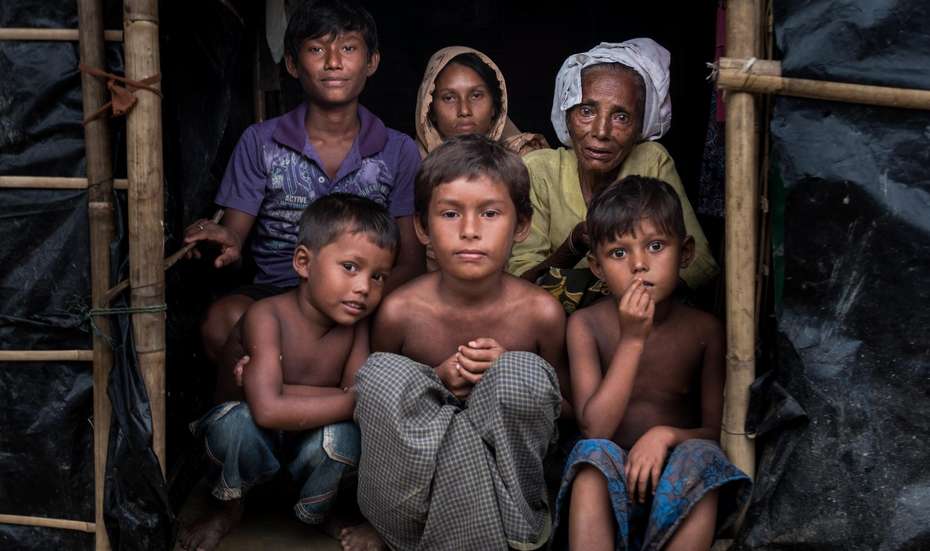
Rhena tells of brutal attacks on village residents. She had to watch as young girls were systematically raped. Many did not survive the torture. Houses were set on fire, the men arrested indiscriminately. Her husband too, she tells me, was seized while trying to protect his family. Rhena still does not know where he is or even if he is still alive. This uncertainty puts a huge strain on the whole family.
Besides the traumatic experiences, many of the Rohingya who fled are also suffering from health problems. They are ill, have fevers, suffer from respiratory illnesses and are extremely undernourished. There is simply a lack of everything and the people need urgent assistance.
Welthungerhilfe is distributing food and hygiene packages
In addition to the rice distributions of the World Food Programme, Welthungerhilfe is distributing food parcels with lentils, oil, salt and sugar. There is also a plan to distribute hygiene packages, which contain items such as soap, diapers, buckets, water containers and other sanitary items. The majority of the refugees have only been here for a few days or weeks, others have been here for 25 years. They came to Cox's Bazar in 1991 with the first large wave of refugees. Even back then there were violent attacks by the non-Muslim population in Myanmar. Hearing these stories is just horrifying and makes clear to me the enormous scope and duration of this conflict.
The most overwhelming thing for me in this humanitarian disaster is the uncertain future of the over 830,000 Rohingya who have fled. There is currently no solution for this conflict. This means that people will continue to be dependent on humanitarian assistance.“The Rohingya are stateless, without rights, without prospects and unwanted. They are denied a free and autonomous life.”
Humanitarian disaster presents Bangladesh with huge challenges
Bangladesh is facing further challenges due to the enormous scale of the refugee influx. The clearing of forest areas and the excessive use of natural resources to ensure bases of existence for the refugees will have serious consequences for the local environment and population. Even before the influx, Bangladesh already ranked as one of the most densely populated countries in the world. 1,110 inhabitants per square kilometre, that is five times as many as in Germany.
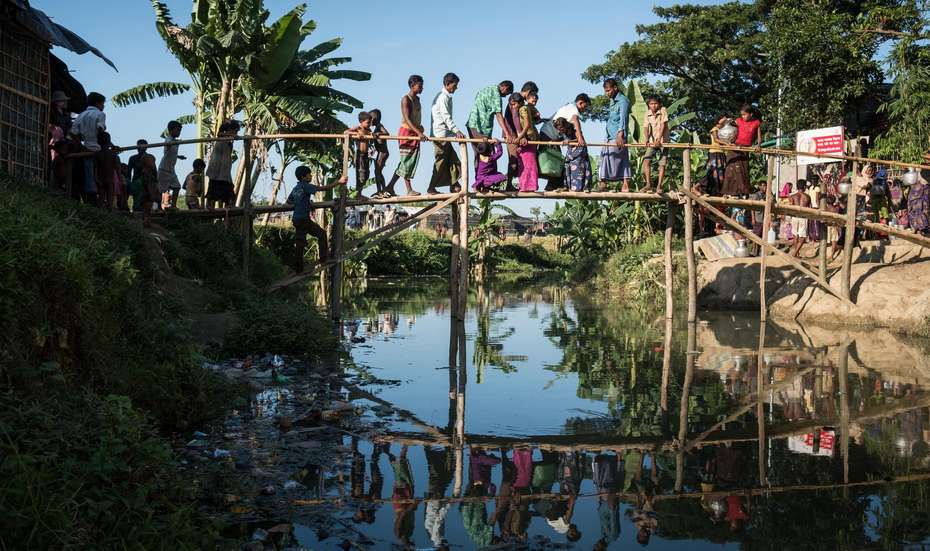
The experiences of different countries that have taken in refugees during humanitarian crises show that international financial support decreases over the course of time, if refugee crises persist. This means that there must be increased pressure from the international community to end this tragedy. The fate of the Rohingya must be made more widely known, in order to prevent another ‘forgotten crisis’ at some point in the future, as it disappears from public consciousness.
Working with its long-standing local partner organisation Anando, Welthungerhilfe is supplying food to 2,600 families in Cox's Bazar district. An expert from the Welthungerhilfe Emergency Response Team is supporting the partner to organise the increase in aid.





